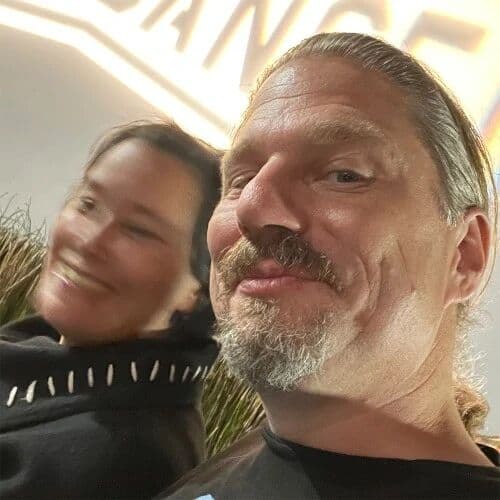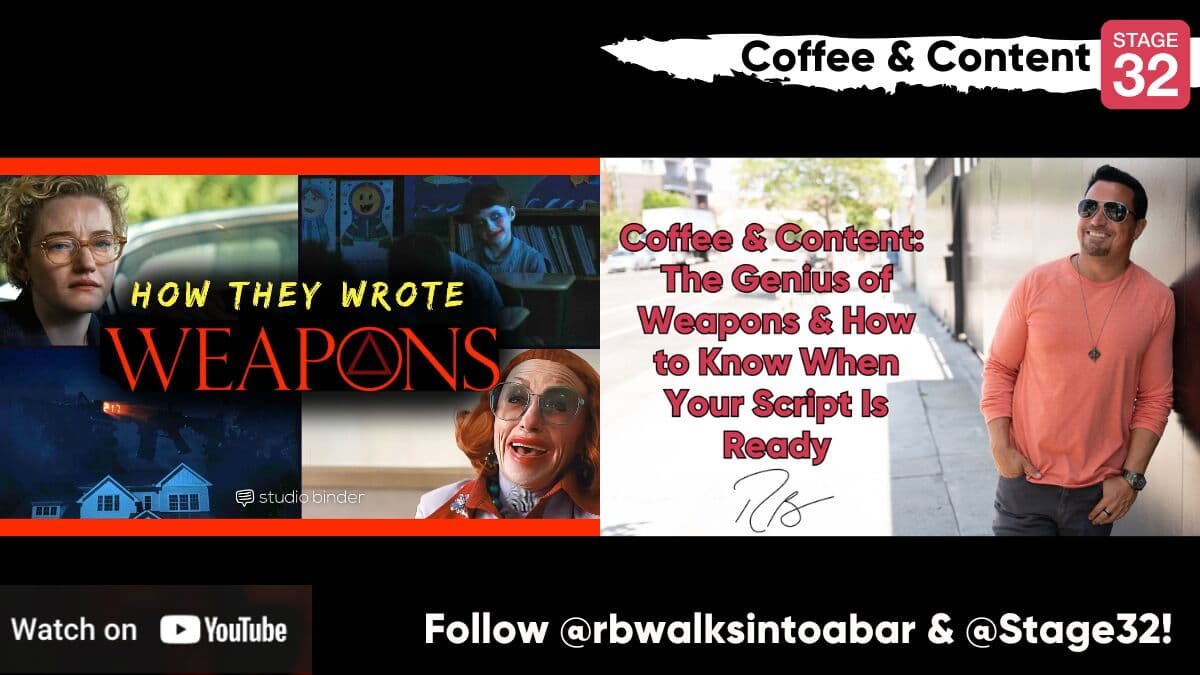Video Game Studios Are The New Streamers

Hello, Dear Readers!
Some of you may remember me from back in the day when I was writing semi-monthly Stage 32 blogs in an emotionally confusing effort to both inform and subvert the discourse that’s always underway in this community. For those who don’t know me, my credentials include the decade I worked as a development executive in the trenches of indie Hollywood, as well as ten years spent serving clients on every strata of Hollywood’s power structure as a script doctor and script consultant. Right now I have two projects in active development under producer Lucinda Bruce. One is a fun, hopeful, very procedural space archaeology adventure called The Lost Star, and the other is a harrowing Indigenous survival drama co-written with my Alutiiq wife called She, Alone.
But that’s not what we’re here to talk about. Today, we’re talking about leveraging a career in screenwriting to find work in gaming and interactive media.

THE HARD TRUTH
Before we talk about anything else, let’s address the stone-cold reality of chasing work in the gaming industry. Most of us have read reports about dire layoffs in game publishing, but even those alarming reports paint only the most cursory picture of some deep and systemic problems. Video game publishers want top-dollar production value at entry-level pay, and they aren’t forced to contend with the same institutions that were organized to project film and television labor. Firing everyone every now and again keeps the labor force desperate, and desperate people are cheap to hire. While these practices may be sold to us as a sign of financial hardship, and while some of it does come from financial overextension in the wake of the gaming industry’s rapid growth during the pandemic, the truth is very simply that tech companies are structured to serve their management at the expense of their labor.
If you think that working in gaming will be easier, more stable, or less stressful than screenwriting, you are wrong. Most of the very best narrative designers I know are out of work, right now. Most of them are just now running out of unemployment, as a matter of fact. If they get new jobs, those jobs will be at a significantly reduced level of pay. Everyone who thinks they have something to offer the world of gaming is getting scared into submission by the overlords who run that industry.
Do not pursue this career path unless making games is something you really, really need to do.

WHY DO IT, THEN?
Over the course of my blogging efforts on Stage 32, we’ve talked a lot about the differences between writing literature and journalism versus writing for the screen. Structurally speaking, a game is not an interactive movie. Deep down at the core of the craft, game design is all about instilling habits in the player. What we build are gameplay systems that the player will use, and practice, and play with until the ability to maximize those systems becomes hardwired into their neurology. Through the cultivation of habit, game design affects the ways in which our players do everything else in their lives. Our hands are, in an almost literal sense, buried in the subconscious minds of our players.
Nothing can change a person’s life for the better, or worse, like gameplay can. What’s more, most players never realize how much their games are affecting them. Play is how we teach ourselves to function in the world, and making games is both a vital contribution and a huge responsibility.
If a person is motivated to make games, and to make them well, then society most definitely needs that work! Narrative design can be part of that process, and good game writing helps drive the stakes and rewards of developing the habits your gameplay instills. Basically, that’s a game writer’s job.
If reading this blog post makes you feel like you want to tattoo a Chess piece on your ankle, then you should probably be making games in some form or other.

BUT NOBODY WILL GIVE ME A JOB!
Yeah. I know.
As screenwriters, our community can be more or less divided into two types of people. Half of us, charitably speaking, want to make great movies. Generally, those members of our community find themselves more willing to take on producing responsibilities when the industry demands it. We support our actors. We volunteer on other people’s productions. Oftentimes, we set our goals aside to help other people.
On the other hand, we have those writers who just want to write. Many of them come from journalism or literature, and many of them came to Hollywood because the publishing industry is a hostile cesspool of corporate self-interest and toxic business practice. Look at what they found when they got here! Instead of the cocaine-fueled geyser of cash and glory they were no doubt expecting, these writers were told to become their own manager, to become their own agent, and then to go get themselves a proper manager and a proper agent so they can submit their work to production companies.
On Day 1, these writers ran face-first into the gaslighting, abuse, and alienation of today’s film development reality. Do you think things got better on Day 2? Dear reader, they did not.
Now, do you think things will be any different for us as we transition from screenwriting into interactive narrative design?
Why do you want to make video games? Is it because you just want to write? If that’s the case, then I know self-publishing sucks. Believe me, because I am now a novelist myself (which was something else that happened while I was away from Stage 32)! Every entertainment industry in these proud United States is fighting the same corporate demons. If you’re writing for publication, then at least your job isn’t complicated by the collaborations getting forced into your process by your medium of choice. If you just want to write, I don’t think gaming is for you.
Do you, on the other hand, want to make a game? If you want to make a game, then go make a game! Get people to play it. Support other game developers. Everything grows from that foundation.

BUILD STRENGTH IN YOUR CRAFT
As of today, I’ve developed three tabletop roleplaying games - which distinctions aside, involve the same type of gameplay you’d expect to see with a game like Dungeons & Dragons. All of the game design is written out in books, and all of the gameplay amounts to improvisational acting and make-believe with some dice thrown in to make the stakes and outcomes of the story a little less predictable.
My first game was a hard sci-fi tonefest with exacting, grinding gameplay mechanics. While I’m still proud of the worldbuilding, it’s not all that much fun to play. Someday, I’ll go back to it. If you read that book today, and if you found out it was written by a white boy in college who wore trenchcoats and welding goggles for purely aesthetic reasons, you would not be even a little bit surprised.
My second game was a fantasy game in which gross liberties were taken when it comes to cultural appropriation. The less said about that game, the better. Lessons were learned, and now we move on.
My third game, Jump Rangers, has been in development for ten years. All of my gameplay constraints have been resolved. In fact, the game plays exactly like a Saturday Morning Cartoon should feel. My worldbuilding hits those same notes. Even more importantly, the game hinges on the practice of letting players use their strengths and resources in innovative, even counterintuitive ways. Players are rewarded in a very literal sense for standing up for themselves, and for their abilities. Imagine a world where kids grow up knowing how to do those things, even when nobody around them is taking the time to teach them!
More than all this, it’s fun. Elegant. Impeccably simple, at least by the standards of the genre. Kids love it. Grown-ups love it. Game developers love it.
See where this is going?

BUILD STRENGTH IN YOUR COMMUNITY
Even as Jump Rangers becomes my gateway into the world of game development, I’ve been making myself part of the gaming community. As a supporter, I’ve been involved enough with a controversially expensive and ambitious indie space game called Star Citizen that I know most of the streamers and a good number of the game’s department heads personally. Maybe I’ll wind up working on Star Citizen, which is certainly something I would love to do. Maybe the people making Star Citizen will wind up playing Jump Rangers with their kids. Either way, we’re building a culture together.
If there’s an indie game I love (“Interloper” on the Apple Store, or “Lunark” on Steam), I’m always careful to buy the game through the developer’s preferred platform. I share the game on social media. I talk to the developers about why I love their work. Maybe I’d even plug that indie game in a Stage 32 blog, every now and again!
Revisiting old games I used to play, and talking on Reddit about the games I’m playing now, has become part of my routine as a game developer. My wife is training to be a Chess grandmaster, and I serve as their punching bag when they need a warm-up. Of course, Chess is becoming one of the things I talk about with colleagues in the industry.
If someone makes a list of the best games ever designed, and if Chess and Go don’t hold the top two spots on that list, then someone screwed up.
Anyway.
Build strength in your craft. Build strength in your community. Make yourself necessary to the game development community. Slowly, people will learn to depend on your presence and value.

THE SAVING GRACE OF GAMING CULTURE
If there’s one institutional factor that makes game development more appealing than film development, it’s the fact that gamedev culture is still very young. While the industry may be monolithic and exploitative, game developers themselves tend to be very enthusiastic about sharing their process and their work. Camaraderie and collaboration are much easier to come by, when compared to my experience in Hollywood.
Getting reviews and publicity for Jump Rangers has never been hard. Someone I look up to in game development, and someone who’s working on a number of TTRPG properties I love dearly, offered up some humbling praise about Jump Rangers after taking the time to read it. Over the last year, I’ve been running an ongoing gameplay stream with some public figures in the world of game development and online geekdom - and they keep showing up because they’re having fun, and because they love the game. Game devs and game streamers will respond to you on social media. My relationships with the people making Star Citizen, for example, are not relationships I would ever expect to have with my favorite filmmakers. Especially when we look at how my screenwriting career, at this point, really does justify my value to my heroes in Hollywood, and when we look at how I’m still a “nobody” in the world of game development…
Except I’m not a nobody. I’ve made a very good game. Maybe I’ve even made a great one. People are playing my game, and having fun, and that’s the basis on which other gamedevs are judging my value.
So, maybe working in game development does present some opportunities that Hollywood’s present-day culture will not allow for. Just don’t plan to tap that potential by offering yourself to companies that are firing all their best people in order to prove that nobody is safe. Just like in film, your mandate is to make something that matters. Help other people do the same. Lean into your ethics, and the fundamentals of your craft, and focus on making games better.
When people start to notice that work, I gotta tell you… it feels pretty great.
Let's hear your thoughts in the comments below!
Got an idea for a post? Or have you collaborated with Stage 32 members to create a project? We'd love to hear about it. Email Ashley at blog@stage32.com and let's get your post published!
Please help support your fellow Stage 32ers by sharing this on social. Check out the social media buttons at the top to share on Instagram @stage32 , Twitter @stage32 , Facebook @stage32 , and LinkedIn @stage-32 .
About the Author

Tennyson Stead
Director, Producer, Screenwriter
Tennyson E. Stead is a master screenwriter, a director, a worldbuilder, and an emerging leader in New Hollywood. Supported by a lifetime of stagework, a successful film development and finance career, and a body of screenwriting encompassing more than 70 projects, Stead is best known for writing an...





